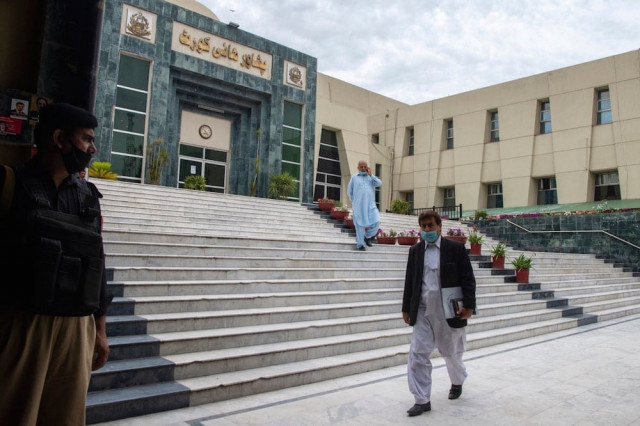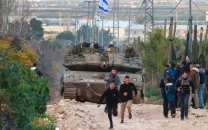PHC withdraws relief granted to PTI leaders in disqualification cases
Court rules 'fugitives cannot claim constitutional rights without surrendering before the relevant court'

The Peshawar High Court has withdrawn the interim relief granted to Pakistan Tehreek-e-Insaf leaders including Omar Ayub, Shibli Faraz, and Abdul Latif in their disqualification cases. The court declared that no fugitive can claim constitutional rights until they surrender before the competent courts.
In a detailed 31-page verdict, authored by Justice Syed Arshad Ali and announced by a two-member bench comprising Justice Syed Arshad Ali and Justice Faheem Wali, the court categorically held that individuals convicted by the trial courts cannot bypass the legal process and seek relief directly from the high court.
The petitions had challenged the disqualification notifications issued against the three PTI leaders following their convictions by Anti-Terrorism Courts (ATCs). Omar Ayub and Shibli Faraz were convicted on July 31 by the ATC in Faisalabad, while Abdul Latif was convicted in May by an ATC in Islamabad.
During the hearings, the petitioners’ counsels, Barrister Gohar Khan, representing Ayub and Faraz, and Advocate Moazzam Butt, representing Latif, argued that their clients were not absconders, as they had appeared before the relevant forums in previous proceedings.
They contended that under constitutional and international principles, their clients were entitled to fundamental rights, including the right to appeal.
Read More: ECP disqualifies Shibli Faraz, Omar Ayub
Barrister Gohar further argued that depriving the petitioners of their constitutional protections amounted to denying citizens access to justice. He emphasised that the PTI leaders were present before the PHC and, therefore, could not be deemed fugitives in the strict sense of the law.
On the other hand, Barrister Sajeel Swati insisted that the petitioners were fugitives as they had not surrendered to the trial courts after their convictions. He maintained that bypassing the appellate procedure and directly approaching the PHC made their petitions non-maintainable.
The federal government’s representatives, Additional Attorney Generals Aamir Rehman and Sanaullah, echoed this stance, asserting that the petitions were not admissible unless the petitioners surrender. Citing both domestic and international jurisprudence, the court underlined that fugitives cannot be granted relief by superior courts.
The court emphasised that constitutional courts cannot be reduced to forums for circumventing established judicial hierarchies. It ruled that until the petitioners surrender before the trial courts and file appeals through the prescribed procedure, their petitions before the PHC would remain ineffective.
The bench consequently withdrew the interim stay orders issued on August 1, 6, and 12, and adjourned the matter indefinitely, granting the petitioners the option to revive their cases once they surrender and comply with due process.
The ruling delivers a significant legal blow to PTI leadership, as three of its prominent figures remain disqualified. It also sets a noteworthy precedence, reaffirming that constitutional protections cannot be invoked as a shield by those deemed fugitives until they respect the judicial process.
In August, Election Commission of Pakistan disqualified nine lawmakers affiliated with PTI, including Faraz and Ayub. Others disqualified include Sunni Ittehad Council head Sahibzada Hamid Raza, Zartaj Gul and Junaid Afzal Sahi.
The ECP also disqualified Rai Hassan Nawaz, Rai Murtaza Iqbal, Rai Haider Ali and Ansar Iqbal. A notification issued by the commission confirmed their disqualification and declared their seats vacant.
Separetely, an ATC in Faisalabad sentenced several top PTI leaders to up to 10 years in prison in cases linked to the May 9 incident, including Ayub, Faraz, Gul, Raza, and former MNA Sheikh Rashid Shafiq, among 108 leaders found guilty out of 185 implicated, while 77 others were acquitted.
May 9 riots
The May 9 riots erupted nationwide following the arrest of former prime minister Imran Khan, after which PTI leaders and workers staged protests targeting both civil and military installations, including Jinnah House and the GHQ in Rawalpindi.
The military condemned the events as a "Black Day" and decided to try the protesters under the Army Act.
As a result of the unrest, many PTI members were arrested and tried in military courts. In December, a military court convicted 25 individuals, including Imran Khan’s nephew, Hassan Khan Niazi, and later sentenced 60 others.
In January, 19 convicts had their sentences pardoned following successful mercy appeals, although PTI expressed dissatisfaction over the limited number of pardons.
The military trials had initially been halted following a Supreme Court ruling but were resumed following the court's instructions to finalise pending cases and announce judgments for those involved in the violent incidents.





















COMMENTS
Comments are moderated and generally will be posted if they are on-topic and not abusive.
For more information, please see our Comments FAQ